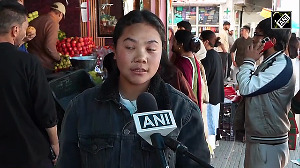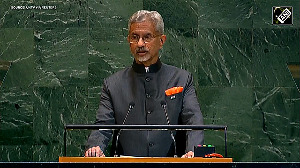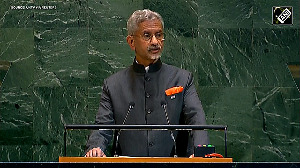With over 62,000 cases of chikungunya reported in Tamil Nadu, the four districts of Namakkal, Dharmapuri, Vellore and Tirunelveli have seen the highest number of cases being reported.
The first case of chikungunya in the southern districts was reported on April 22. It peaked in July when 700 cases were reported in a week. Since September 3, no new cases have been reported.
High fever, pain in the joints, body pain and difficulty to look directly at sunlight are the symptoms of chikungunya.
Here's how the Tamil Nadu government is going about containing the outbreak.
Chikungunya being a viral disease, there is no known treatment till now. Doctors are treating the symptoms. They treat fever with paracetamol tablets and high fever with injections of the same.
They treat joint pains with two drugs. Diclofenac Sodium and T Ibuprofen. All the primary health centres in the area are stocked with these drugs.
In the Tirunelveli area alone, drugs worth Rs 5 lakh were supplied.
Each primary health centre that handles chikungunya cases has a doctor, a nurse, a pharmacist and a laboratory assistant. Apart from treating patients who come to the centres, this team also conducts mobile outreach camps in faraway villages.
A blood test is first conducted on patients having fever. This is to rule out Malaria. Urine samples are also tested. For the outreach camps, the team takes a Siddha doctor, who gives external ointments to treat body ache.
Doctors say that by doing so, they ensure that patients avoid drug intake for long periods, which may lead to other complications.
The fever lasts for three days and the joint pain up to four weeks, depending on the health of the patient.
Old or weak patients may have the pain for six weeks.
While to the credit of the medics, chikungunya hasn't claimed any lives in the southern districts, doctors add that patients who have recovered do not show any residual deformity or paralysis.
In September, the health department even launched a special programme aimed at preventing the spread of the outbreak.
Every primary health centre visits all the households in its area. Every fresh water storage facility, including tanks, sumps, cisterns and vessels, is checked. They then add 2.5 ml of abate (a chemical name Teme phos) for every 10 litres of water.
The abate costs Rs 870/litre.
This destroys the larvae of the Aedes mosquito that spreads Chikungunya. Abate is not used in drinking water sources. This operation will reduce the mosquito density.
In every block, 10 workers will be appointed to carry on this work for 6 more months after the current operation gets over on 18th October.
This will also prevent dengue infection, as the same mosquito -- Aedes is responsible for that disease too.
The teams resort to fogging too, in order to destroy the adult mosquitoes.
In the rural areas, the health teams have chosen a sentinel village in each of the blocks.
A village from where the maximum cases have been reported is usually chosen. The water storage facilities are kept under close watch.
With the rising death toll in neighbouring Kerala, the government has stepped up efforts.
For instance, Tirunelveli district Collector G Prakash has sought the co-operation of other government departments. With more departments coming on board, the health department's job has become easier. The other departments help in reaching out to schools and spread awareness through other channels also.
Despite all these measures, if the health officials spot a serious case, they refer them to the Tirunelveli Medical College Hospital. The hospital's Microbiology team will then send the serum samples of these patients to Pune for testing.
Dean of the medical college, Dr S Vinayagam told rediff.com that all patients sent to them have been given symptomatic treatment.





